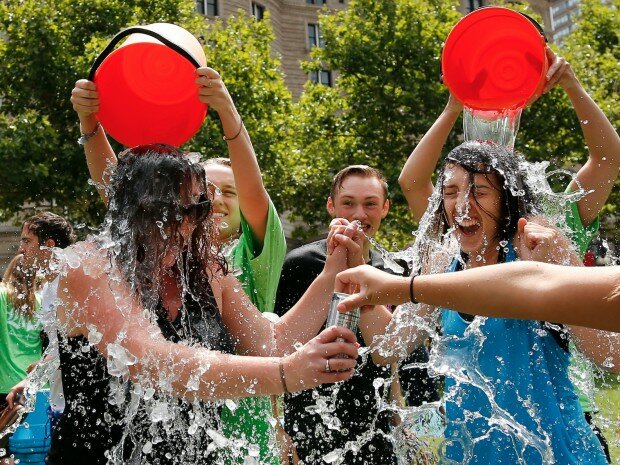When was the last time you donated to a charity?
It may have been last week to the homeless man on the corner or last Christmas to the Salvation Army.
Now think back to the last time you participated in a charitable event, whether you raised the money personally or not. You can probably think of a few 5K races, bake sale participations or trending social events that you helped take part in from sharing a link on Facebook to dancing for Dance Marathon.
There’s been a lot of negativity with the trending #icebucketchallenge, which seeks to spread awareness about amyotrophic lateral sclerosis, commonly known as Lou Gehrig’s Disease. Detractors of the social media campaign argue that participants use the ice bucket challenge to make themselves feel charitable when, in reality, all they really do is just pour ice on their heads.
They call this form of charitable action “slacktivism,” which, according to Huffington Post, is “attributing your time and a social post in place of that donation.” Besides the fact that “slacktivism” is a ridiculous, made-up word, it’s a pejorative that creates unnecessary negativity.
Obviously a charity benefits most directly by people donating both their time and finances to a cause. However, people aren’t going to donate and know about a cause if something doesn’t grab their attention.
So what if half of the people who participate in the ice bucket challenge don’t actually donate money? The point is that they’re spreading awareness by reaching out to other people and creating a chain effect. And maybe, just maybe, when you hear about the next charitable event for ALS, you will be more inclined to participate.
Charities are tricky because people who donate like to call themselves tall and look down on people who just share a link. But we’re all helping a cause and we’re all doing something to benefit the world whether our donation is $100 or nominating three individuals who will pour ice on their heads.
The ice bucket challenge has gone viral, which spreads awareness faster than anything that requires donations would. How many people would participate if they were forced to pay a $100 donation after the 24-hour nomination period? The point is that we’re all helping in our own way.
The Huffington Post argues that we use these charitable actions to look cute in a bathing suit and call ourselves good citizens by posting a link and ignoring the financial aspect. Then they had the nerve to compare it to Kony2012.
“We could share the Kony video on our Facebook and Twitter — and while doing so, eliminating any chance we may have had at donating our time or money towards an actual prevention or cause directly related to the capture of Kony,” according to the Huffington Post.
Let me take a deep breath before I ask if HuffPo is aware that by clicking a button and sharing that Kony video, Invisible Children raised over $30 million in 2012 (according to news.com.au). So their argument that clicking the button doesn’t really do anything just blew up right there.
Kony2012 is one of the most famous campaigns to ever hit the world, so how can one possibly argue that clicking and sharing a video makes no progress? Regardless of anyone’s donation, when people click that button, put ice on their heads or write KONY2012 on their arms, they’re making a difference. They’re saying I’m part of a movement that will not be ignored.
I don’t understand the necessity for negativity with charitable events. We’re all doing our part in some way, even if mine is smaller than yours. The world would be an incredible place if #clickheretodonatetoadisease trended over #icebucketchallenge, but that isn’t the world we live in. Our human nature pushes us to strive toward things that are creative and interesting, which can also promote great causes. Without those creative ideas and campaigns, how much money would ever be donated? How much attention would ALS receive this year?
You know the “I love boobies” bracelet you wear every day? Did you buy it? I didn’t buy it— I received one as a gift — but does that make me any less part of the cause? If you have the finances to donate to every charity in the world, then good for you. But for the rest of us, time is what we can donate, and I don’t think anyone should be criticized for that. Charities should invoke positivity, not battles of “I’m a better person cause I donated money, and you didn’t.”
If we put our swords away for a minute and really think about the charity, it’s obvious significant progress has been made. Maybe this campaign didn’t raise as much money had every single participant donated, but that’s an unrealistic expectation anyway.
People help in the way they can. And I think the fact that we live in a world where people all over the world are pouring ice on their heads every day is pretty incredible.
Featured photo courtesy of: USA Today








